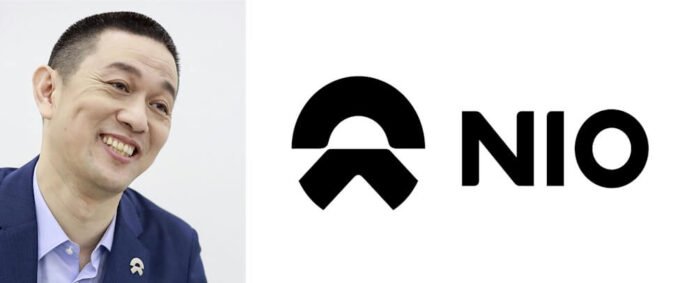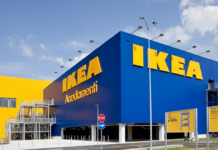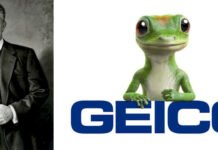The NIO logo ably represents the company’s Chinese name Weilai, which stands for Blue Sky Coming. The top part of the NIO logo represents the sky, vision, openness, and the future, while the bottom part represents the earth, action, direction, and forward momentum.
The guiding philosophy for NIO is Blue Sky Coming and stands for the company’s commitment to a better and brighter future.
NIO is an electric Chinese car maker that was founded by William Li, aka Li Bin, in 2014. The company is headquartered in Shanghai, China, and specializes in designing and manufacturing electric vehicles.
The Nio Logo was designed with the idea of having the sky and earth incorporated into the design. The top part of the logo represents the sky giving the presence of vision. The bottom part of the logo represents earth, creating action. The logo is simple and easy to remember for branding purposes. I think they nailed the overall look and idea of the logo.

The History of NIO
NIO (Weilai in Chinese) is a global Chinese automobile manufacturer that designs and develops electric vehicles. Headquartered in Shanghai, China, the company also takes part in the Formula E Championship, though it has stopped funding the motorsport championship after selling its Formula E Team to Lisheng Racing.
Overview
NIO and the Nio Logo was established by William Li (Li Bin in Chinese) in November 2014. Li is also the Chairman of NextEV and Bitauto. After NIO’s launch, a number of companies invested in the firm, including Temasek, Tencent, Lenovo, TPG, and Sequoia. NIO’s first car model, the NIO EP9, was launched the same day the company was founded.
In 2016, the California Department of Vehicles gave NIO permission to road-test its vehicles, and the company announced that it’d start testing its vehicles on public roads. According to NIO, it planned to introduce vehicles with Level 3 and Level 4 driving autonomy.
NIO launched its first battery swap location in Nanshan, Guangdong, China, in May 2018, under the name “Power Swap Station.” This station would only have batteries for ES8 vehicles. In September the same year, NIO filed for an initial public offering worth $1.8 billion on the NYSE.
In April 2020, the company announced a $1 billion funding from a bunch of new Chinese investors, which the company badly needed due to its struggles at selling its cars. As part of this new deal, NIO would relinquish its assets to NIO China, a new subsidiary that would be based in Hefei, China.
In August of the same year, NIO launched BaaS (Battery as a Service) and founded a battery-oriented asset management firm in conjunction with Hubei Science and Technology Investment Group Ltd, Contemporary Amperex Technology Company Limited, and a Guotai Junan Intl Holdings Ltd subsidiary. Each company contributed RMB200 million (about $33 million) toward the venture for a 25% stake each. Baas helps reduce the buying price of electric vehicles from NIO by around 25%.
NIO announced an expansion plan in Norway in May 2021, saying it’d start delivering vehicles to the country by September 2021. True to its word, the company delivered 24,439 ES6, ES8, and EC6 cars, a new third-quarter record representing a 100.2% growth year on year.
NIO Worldwide Locations
NIO brings together the world’s technology and automotive movers and shakers across its offices in Shanghai, Beijing, London, Munich, San Jose, and six other international locations.
Shanghai: NIO’s worldwide head office is located in Shanghai. The head office employees are mainly in charge of manufacturing operations, integrated vehicle R&D, marketing, sales, and customer service.
San Jose: NIO’s worldwide software development center and North American headquarters is located in the Silicon Valley and covers more than 187,000 square feet.
Munich: Munich is NIO’s design headquarters, and it’s known for its great track record in automotive design.
London: NIO’s office in London serves as the company’s Formula E team base and is in charge of the performance program. The key responsibilities of the London office include NIO’s supercar development, strategic management, and commercial Formula E running.
NIO’s Technology

NIO Pilot: This is NIO’s SAE Level 2 half autonomous system that comes with ADAS features. It was introduced at the same time as the company’s ES8 model. The NIO pilot has been improved upon with a number of over-the-air upgrades throughout 2018 as well as 2019, introducing features like lane keeping, lane departure warnings, adaptive cruise control, automatic emergency braking, traffic jam pilot, auto lane change, highway pilot, and lots more.
The NIO Pilot Sensor set consists of 5 radars, one trifocal forward camera, one driver monitor camera, and 12 ultrasonic sensors. NIO became the first car manufacturer to establish a vehicle model that uses the EyeQ4 vision chip from Mobileye.
NIO partnered with Mobileye in November 2019 to make a consumer car boasting Mobileye’s full Level 4 self-driving system that might be available to customers by 2022.
NIO Divisions
NIO Service refers to NIO’s group of service centers.
NIO Life refers to NIO’s clothing line, made in conjunction with Hussein Chalayan.
NIO Power refers to NIO’s group of battery swap locations, power home, power mobile, as well, as superchargers. The company has 122 battery swap stations all over China, including 18 swap stations along the country’s G4 Expressway.
Battery Swapping
While Tesla has given battery swapping a try, it has never fully deployed it and instead uses its Supercharger network. On the other hand, NIO has put together an operational network of about 700 battery swap locations that cover thousands of expressways in China.
The first stage was setting up 18 battery swap locations in 14 different areas along China’s G4 Expressway, a 1,412-mile road connecting the national capital Beijing with the world’s biggest urban area comprising Shenzhen and Hong Kong called the Pearl River Delta. This project was finished in November 2018.
In the second phase, battery swap stations were installed in 8 areas along the 753-mile-long G2 Expressway, which links Beijing with Shanghai. The second phase was finished in January 2019.
By August 2020, NIO had installed 143 battery swap locations across 64 Chinese cities and done more than 800,000 swaps for its clients.
These battery swap stations reportedly complete the swapping within five minutes.
In March 2021, NIO finished its two millionth swap in Suzhou. In addition, the company has also set up 193 battery swap stations, 327 destination stations, and 134 supercharging stations across China.
In December 2021, NIO set up its 700th battery swapping location in China, reaching its yearly target well in advance. The company’s second-generation battery swapping location allows the car to automatically find parking in the station, allowing users to have a 3-minute battery swap without stepping out of their vehicle.
Thus far, NIO has completed more than 5.3 million battery swaps for customers in China. Battery swaps have turned into one of the best power fixes among NIO users.
NOMI
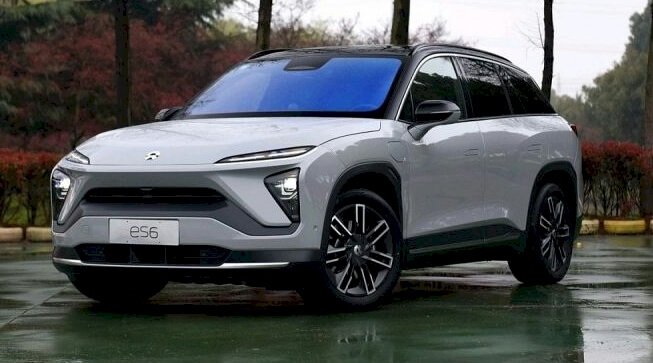
NOMI is an artificial intelligence technology that’s reportedly the first in-car artificial intelligence system in production cars. NOMI can open and close windows, halt the vehicle’s navigation, change the cabin temperature, and control the music. And something unique to NIO vehicles is that they can take a passengers’ selfie in the cabin.
Formula E
One of the pioneering Formula E teams is the one from NIO, which originally competed under the moniker Team China Racing. Prior to the end of the first season, the team was renamed NEXTEV TCR.
In the inaugural season, Team China Racing’s lead racer Nelson Piquet Jr was named the best driver in the FIA Formula E after clinching two races in Moscow and Long Beach. However, NIO’s Formula E team only managed a 4th place finish in constructor’s title race, partly due to a revolving door cast of second-choice drivers that didn’t taste consistent success like Piquet.
The FIA Formula E Championship allowed for car development from the second season onwards, with different teams coming up with powertrains of their own. NIO deployed its very own NEXTEV powertrain design, but it experienced a drop in team performances for the constructor’s title as they finished just 9th in the second season, 6th in the third season, and 8th in the fourth season.
The team had gone through three name changes by this time, namely NEXTEV, NEXTEV NIO, and just NIO. In the fifth season, the team’s meager successes dwindled even further as it languished first in 11th place and then last in the standings.
For the sixth season (2019-2020), Lisheng Racing acquired NIO’s Formula E team and renamed it NIO 333 Racing. And for the first time ever, NIO didn’t provide its own powertrain design for the vehicle, opting instead to use the previous year’s powertrain named Dragon. This powertrain was renamed under NIO’s brand name, and NIO was listed as a manufacturer.
Top 3 NIO Competitors
Tesla: Founded by Elon Musk in 2003, Tesla is a renowned California-based electric vehicle manufacturer and clean energy company. It provides its customers with some of the most powerful electric vehicles and the best alternatives, hence its dominance in the market. The autopilot mode is Tesla’s most effective feature.
Apart from designing and manufacturing electric vehicles, Tesla also makes solar panels, solar roof tiles, battery energy storage, as well as other associated products and services.
Rivian: Rivian is an American electric car manufacturer that will provide NIO with serious competition in the near future. The company has recently raised its investment by $2.5 billion.
Prior to that, it had managed to raise $1.2 billion in two rounds of funding. According to reports, Rivian intends to start manufacturing its RIS SUV and RIT pickup in 2022.
Li Auto: Li Auto is a Chinese smart electric vehicle maker that Li Xiang founded in 2015. In both 2020 and 2021, the firm was listed on the Hong Kong and US stock exchanges.
Li Auto became the first Chinese company to manufacture extended-range electric cars with a small gasoline-powered engine that can generate extra energy for the battery. The company is making extended-range vehicles because of insufficient charging facilities in China—less than a quarter of families in major cities have adequate space for setting up a home charger.
Li Auto currently sells a 6-seat premium SUV it first made in 2019 named the Li ONE model and a newer Li ONE model in 2021. By March 2021, Li Auto had generated $547.5 million in revenue, fuelled by soaring demand for electric vehicles.
Wrapping Up the History of NIO
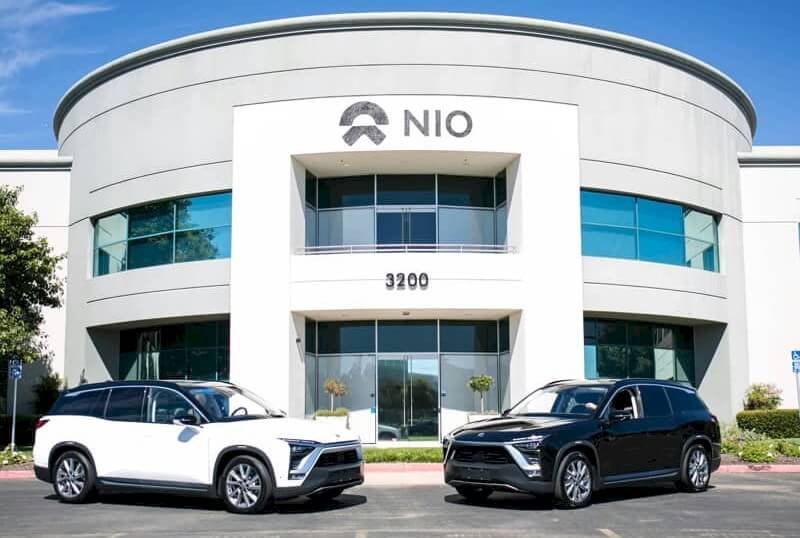
NIO Inc. is a pioneering premium electric vehicle manufacturer in China. The company designs jointly makes and sells smart premium electric vehicles, pushing innovations in futuristic technologies when it comes to autonomous driving, artificial intelligence, and connectivity.
Redefining user experience, NIO provides customers with comprehensive, innovative, and convenient charging solutions as well as other user-oriented service offerings. The Chinese name for NIO is Weilai (Blue Sky Coming in English), which reflects the company’s vision and devotion to a more eco-friendly future.
NIO developed its first model, the EP9 supercar, in 2016. Along with strong driving performance and attractive design, the EP9 delivers incredible acceleration and first-class electric powertrain technology, positioning the company as a luxury brand.
NIO launched its first volume-made electric car, the ES8, in December 2017 and started making deliveries towards the end of June 2018. A premium, 7-seater 100% aluminum alloy body electric SUV, the ES8 offers exceptional functionality, performance, and mobility lifestyle.
In December 2018, NIO officially introduced the ES6, a premium, 5-seater high-performance electric SUV, and started delivering the model in June 2019.
NIO is a pioneer in automobile smart connectivity as well as enhanced Level II autonomous driving. The company also boasts NOMI, one of the most modern in-car AI assistants created by a Chinese firm. It’s a voice-activated AI assistant that customizes one’s driving experience.
NIO offers exhaustive value-added services as well as an innovative and convenient set of charging options to its customers. These options include the company’s home charging solution Power Home, its pioneering battery swapping service Power Swap, its mobile charging service via charging trucks Power Mobile, and its 24/7 on-demand drop-off and pick-up charging service Power Express.
NIO believes that these services and solutions will together create a wholesome customer experience throughout the life cycle of the user’s vehicle.
NIO also envisions a future in which enhanced smart electric vehicle technologies, along with a better vehicle ownership experience, will spur increased adoption and appreciation of smart electric vehicles, contributing to a better future for the world.

